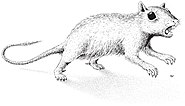Wikipedia:Today's featured article/May 3, 2020
Catopsbaatar was a rodent-like mammal in the order Multituberculata that lived in what is now Mongolia during the Late Cretaceous epoch, about 72 million years ago. The first fossils were collected in the early 1970s, and the species received its own genus (Catopsbaatar, Greek and Mongolian for 'visible hero') in 1994. Five skulls, one molar, and one skeleton with a skull are known. The skull of Catopsbaatar was up to 70 mm (2.8 in) long, heavy-set and wide, with the zygomatic arches strongly expanded to the sides. The ankles had spurs like those of the male platypus and echidna, but apparently without the platypus's venom canal. The spurs of Catopsbaatar and other Mesozoic mammals may have been used for protection against theropod dinosaurs and other predators. Like other members of its order, this species probably gave live birth, and the presence of hair indicates it was warmblooded. Its fossils were found in the Red Beds of Hermiin Tsav and the Barun Goyot Formation in Mongolia. (Full article...)

